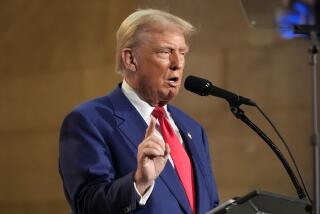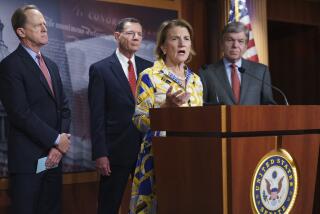Bush Poses Tax Deduction for Small Businesses
- Share via
O'FALLON, Mo. — President Bush on Monday proposed a greater tax deduction for small businesses as a fresh incentive for them to buy new equipment, a move that he said would lead to more jobs.
“In my judgment, we’re not out of the woods yet,” Bush said, referring to the economic recovery that many economists believe is underway.
Beginning a two-day focus on the economy and small business, the president also asked Congress to adopt legislation that would enable small businesses to increase their purchasing power by banding together to buy less expensive group health insurance for their employees.
Today, Bush will unveil a package that includes a mixture of “tax simplification, tax relief, assistance to provide health care to employees [and] reductions of regulations and barriers to growth,” said White House Press Secretary Ari Fleischer.
Administration officials said the Treasury Department will soon announce final rules to allow service-oriented businesses with less than $10 million in gross receipts to use cash accounting rather than accrual accounting.
This change will significantly reduce the paperwork burden for hundreds of thousands of small businesses, officials said, and allow these businesses to immediately deduct the cost of supplies and to defer paying taxes until income is received.
Bush also is to propose allowing small businesses to earn interest on their checking accounts, which is banned under laws enacted during the Depression, officials said Monday night.
For many small businesses, the interest income on their checking account balances would defray other significant costs.
The president also renewed his vow to eliminate the inheritance tax, which earned him a thunderous ovation from several hundred small-business workers and their families here.
Lauding America’s small-business owners, Bush noted: “More new jobs are created by small business people than anybody else.” Small business, he added, “represents one of the true strengths of our country.”
Bush’s appearance here demonstrated anew his keen awareness that a president’s popularity as a war commander may not sufficiently shield him from voters’ wrath at the ballot box if the economy is ailing--as his father, the 41st president, learned in 1992.
Bush spoke before a backdrop featuring two large signs, both containing the phrase “Working for America.”
The setting was the warehouse of Albers Manufacturing Co., an award-winning small business 30 miles west of St. Louis. The company, which makes electrical and mechanical parts for communication equipment, has been hit hard by the economic downturn and has had to lay off employees.
In his remarks, Bush also provided an update on the war and renewed his plea to Americans to perform volunteer work and help those in need.
“Materialism itself is a dead end,” said the president, who only a few months ago had urged Americans to spend as a way to keep the economy from sliding into a recession.
One proposal that Bush specifically mentioned would increase the maximum tax deduction that a small business may take when it buys new plants or equipment.
The law currently allows an immediate deduction of the full cost of the first $24,000 if a business invests less than $200,000 a year. Bush wants to increase that cap to $325,000 and allow a first-year deduction of $40,000.
The White House said this depreciation proposal would cost $7 billion over 10 years, and repeal of the estate tax would cost $104 billion over 10 years.
The concept of pooling purchasing groups to buy health insurance is not new. It was a central feature of the massive plan to revamp the nation’s health-care system put forth in 1993 by President Clinton and his wife, Hillary Rodham Clinton.
After his appearance here, Bush attended a state Republican Party fund-raiser in St. Louis expected to bring in $1.3 million--$850,000 for the party and $450,000 for Senate candidate Jim Talent.
Talent, a former congressman who ran unsuccessfully for governor two years ago, is the front-runner in the Republican primary to challenge Sen. Jean Carnahan, a Democrat appointed to the Senate. Her husband, Mel, then the governor, defeated incumbent Sen. John Ashcroft, now Bush’s attorney general, in 2000 despite his death in a plane crash just weeks before the election. Jean Carnahan was then named to fill his seat. This election will determine who serves the remaining four years of the six-year Senate term.
More to Read
Inside the business of entertainment
The Wide Shot brings you news, analysis and insights on everything from streaming wars to production — and what it all means for the future.
You may occasionally receive promotional content from the Los Angeles Times.










